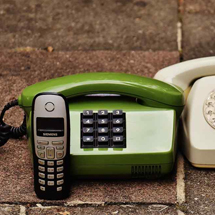
Resources
The PSTN/ISDN stop sell has already begun. If you’re not prepared for the Great British Switch Off, here’s some resources to help you.
Here you can find resources to help you plan and get your business, and your customers, ready for the Great British Switch Off.
We've got webinars, PDFs, FAQs and other useful documents for you to download and use. If you have any particular requests or questions then please fill in the form at the bottom of the page and we'll be happy to help.
Zen Partner Webinar - August 2023
In this webinar delivered to our Zen Partners, our experts talk you through what will happen when the September stop sell comes and how to get your business and your customers prepared for the December 2025 switch off.
Hosts:
Nick Tiddy, Head of Business Development
Andrew Sayle, Connnectivity Portfolio Manager
Jodie McGovern, Voice & UC Portfolio Manager
Comms Business Webinar - May 2023
In our latest webinar with Comms Business Zen’s experts talk through the very latest on the switch off, giving you more details on what is happening and when and how Zen supports Partners not only with reliable products at a great price but also with a safe pair of hands – delivering you an exceptional partner experience so you can deliver a great experience to your customers.
Hosts:
Nick Tiddy, Head of Business Development
Mark Howarth, Head of Trading and PX
Andrew Sayle, Connectivity Portfolio Manager
Zen Partner Webinar - February 2023
In this webinar delivered to our Zen Partners, our portfolio experts talk you through the upcoming switch off, how to audit your customers and get ready for service migrations.
Hosts:
Andrew Sayle, Connectivity Portfolio Manager
Lee Houston, Voice & UC Portfolio Manager
Your questions answered
Click below for the questions we got during the webinar.
What happens when you have a customer than can only get ADSL?
According to the latest data from Thinkbroadband.com, 99% of premises can now access "fibre" broadband. We appreciate that’s little comfort for those in the 1%. The remaining 1% are mostly in rural areas or have exchange only lines in town/city centers. We expect the roll-out of FTTP, either through government-backed programs or commercial deployment from the likes of Openreach, will resolve this issue for many addresses. Openreach aims to increase its coverage by millions of addresses, more than doubling the current coverage, over the next few years. Openreach are delivering the equivalent of a town's connectivity each week, 60,000 premises every week. Should we have ADSL customers and without alternative access as the 2025 switch off approaches, we will ensure that a solution is in place. SOTAP could be the solution.
What obligation do OR/BT have to supply a service? We have a customer who is on a FTTC/P enabled exchange, but they are in the middle of nowhere and FTTC speeds are slower than existing ADSL2.
In the UK the government has legislated for a Broadband Universal Service Obligation (USO). The USO is a UK-wide measure intended as a “safety net” to deliver broadband to those premises that do not have access to a decent and affordable connection.
The Government have defined a decent connection as one that can deliver 10 megabits per second (Mbps) download speed and 1Mbps upload speed (along with other defined quality parameters). Ofcom has defined an affordable connection as one that costs less than £45 per month.
The USO provides a legal right to request a decent broadband connection, up to a cost threshold of £3,400 per premises.
But it should be noted that the USO only applies to two broadband retailers, BT and KCOM in Hull.
BT and KCOM can use any technology capable of delivering the minimum technical USO standards, including mobile broadband. Depending on the technology used, some consumers may receive a higher quality connection than the minimum standards.
Details of the USO can be found here.
When are you going to make your VoIP service compatible with third party equipment. The Fritz routers are not always ideal for some small businesses.
We would encourage you to look at our CloudComms proposition, which is not dependent on the Fritz Solution.
We have Zen FTTC customers who cannot get FTTP, what should we be doing with their analog service?
You should be looking to move FTTC customers who cannot get FTTP to SOGEA. If by analog you are referring to the voice element specifically, then an IP alternative would be required which in Zen's instance would be delivered by CloudComms.
What is the plan with the Lease Line / Ethernet services that come with the ADSL / FTTC back up lines?
We will offer SOGEA / FTTP backup options.
When will the trial of the 4 port FTTP installs be completed, to allow us to order the 4 port ONT at the point of order?
Openreach are continuing to trial new multi-port ONTs in parts of South Wales and West England. So far Openreach have not confirmed launch dates or the timeframe for a national rollout. Zen hopes to receive an update from Openreach later this month (Feb-23)
For a customer who has FTTC with WLR and doesn't use the phone line what would be the timeline on how long a migration would take and could this be done without any loss of service on the broadband circuit to the customer?
The minimum lead time would be 1 working day. When a FTTC line is migrated to SOGEA there is typically no more than a few seconds downtime.
Can we move a GFast contract to a SoGFast?
At the moment Zen does not support SOGFAST.
Are Openreach going to allow multiple FTTP connections to a house? We have a customer with a lot of home workers and they prefer a dedicated business line. If the end user has personal FTTP, we can't install a Zen business FTTP.
Openreach and Zen both support installing multiple FTTP connections at a single address. Today that generally involves installing multiple ONTs. But, Openreach are trialling a new multi-port ONT that will allow upto 4 connections. The trial is running in parts of South Wales and West England. So far Openreach have not confirmed launch dates or the timeframe for a national rollout. Zen hopes to receive an update from Openreach later this month (Feb-23)
What plans do Zen have to apply pressure to Openreach where exchanges are only offering ADSL and no sign whatsoever of FTTC/SoGEA?
We will continue to encourage OR to build out FTTP to rural locations.
When regrading a line from FTTC to SoGEA, is there end user downtime? If so, how long is it normally?
When a FTTC line is migrated to SOGEA there is typically no more than a few seconds downtime.
Can you confirm there are no plans to turn off SOGEA? So if you put a customer on SOGEA in the absence of FTTP they can stay on it indefinitely?
Openreach have no plans to turn off SOGEA for customers without access to FTTP. SOGEA and FTTP are Openreach long term strategic products.
How do we get around engineers using existing line plant from existing numbers when the selected order type was new?
It is Openreach's policy to use spare pairs to install SOGEA when possible. Openreach should never use existing line plant if it is used for an active service (unless a working line takeover has been requested).
Is anything happening to GFast circuits in the switch off?
G.Fast relies upon a WLR line so it must be migrated to an alternative product before the WLR network is switched at the end of 2025. A significant percentage of G.fast enabled areas have already been overbuild with FTTP and it's Zen expectation that this trend will continue as Openreach build to 25 millions premises.
Can we get a better idea of when Openreach will be in an area rolling out FTTP. All we see currently is "Before 2025" etc which is no use whatsoever.
Your Zen Account Management team will be able to supply copies of Openreach's deployment reports. These report detail all the addresses that can access FTTP right now. But also the addresses Openreach hope to cover in the next 3 months and in the next 4-15 months.
What are the physical differences between SoGEA and FTTC?
Both SOGEA and FTTC use a technology called VDSL. VDSL runs on the copper line from the street cab to the customers premises. The difference is with FTTC the copper line also carries a voice signal back to the exchange. With SOGEA the copper line will not carry voice back to the exchange.
What’s your approach for customers with WLR3 lift lines and/or gate lines for example?
We would strongly encourage customers to engage with the equipment providers directly, OR has been clear that the emphasis must be on these providers to deliver an alternative, and we are seeing many GSM options enter the market, especially for lift lines. All lifts carrying passengers in the UK require an emergency communication system (Lift Regulations 1997):
– Allows passengers to summon help if they become trapped in the lift
– Available for use at all times when the building is occupied
– Power backup capable of supporting MINIMUM 1 hour of standby, 15 minutes of talk time and issuing an alert if the power backup falls below these levels
– Places a test call every 3 days (minimum)
Vast majority of emergency communications equipment installed on these lifts is ANALOGUE and designed to work on copper lines
– Specifically, these units rely on Dual Tone Multi Frequency (DTMF)signalling to operate correctly
WLR3 lift lines can be replaced by either SOGEA or FTTP, an Analogue telephone Adaptor (ATA) and VOIP service. The ATA should be tested to ensure it correctly supports all 16 DTMF tones required by lift alarm systems. It's important to ensure that a suitable UPS is installed to ensure all equipment remains operational during a power outage. You should put in place a robust maintenance plan for the UPS.
Business communications for a new era
We recently conducted a survey of 1,000 CEOs and IT decision makers across large and SME businesses to assess their readiness for the impending PSTN and ISDN switch off, and what we discovered paints a picture of the changing role of various communication technologies and ways of working.
Read the full report below.

New government guidance
UK transition from analogue to digital landlines
The government, in conjunction with Ofcom, Tech UK and Openreach have released some new guidance on the switch off which you can now read on their website.
Click below to find out more.
Are you aware of vulnerable customers?
When thinking about migrating your or your customers' copper services, you'll need to consider how this might impact any vulnerable customers, or indeed whether you're a vulnerable customer yourself.
Sooner or later, you'll need to identify customers who may be classed as vulnerable or require special services, to make sure they're fully supported when they're migrated.
The term 'vulnerable customers' refers to a much wider group of users than you may be thinking. It can include consumers with sight, hearing or mobility issues, but for business customers it can also include alarm, telecare, lift, energy and water companies - any services that rely on analogue connectivity to function.
Below you can download some fact sheets that will help you plan to look after your vulnerable customers.
Zen Customer Vulnerability
The nations network is changing...are you ready?
Webinar - June 2022
In this webinar, our portfolio experts talk you through the upcoming switch off and advise on what's best to do with your copper services
Hosts:
Andrew Sayle, Broadband Portfolio Manager
Jodie McGovern, Portfolio Analyst
Frequently asked questions
Click below to read all our Great British Switch Off related questions and answers.
Have a question that's not been answered? Submit it using the form on the bottom of the page. We use this information to update our FAQ's.
What do we mean by stop sell?
In essence, the stop sell simply means that certain products relying on the Openreach network will no longer be sold.
So, from a given date you may, for example, no longer be able to order a new analogue telephone line or ADSL / FTTC broadband connection.
By September 2023 you’ll no longer be able to place an order for any broadband package or phone line that relies on this old copper system, and by 2025 it will be shut down altogether.
What is PSTN?
The Public Switched Telephone Network is the traditional telephone system that dates back more than a hundred years (delivering your business calls and traditional broadband connectivity). It uses analogue technology and copper wires which - although they have served the UK well over many years – are unreliable and poorly performing compared to more modern, digital alternatives.
Why is the ‘Switch off’ happening?
Given that the current PSTN (Public Switched Telehone Network) system can be dated back to the 19th century, there are now better, more modern options available that offer greater reliability and speed. Openreach have now made the decision to retire the old system to enable them to support this better, more modern technology.
Can I keep my traditional landline / broadband till the switch off in 2025?
That all depends! Openreach has planned a phased switch off of the PSTN (Public Switched Telephone Network), so some areas have already been fully switched off from the public switched telephone network - homes and businesses in those areas have already had to make the transition to the digital technologies. So it all depends on where you’re located. Although 2025 is the final switch off date, this is not a big bang approach. In fact many areas will be switched off much sooner.
How will I know if my connectivity is ‘Switch off’ ready?
If you’re currently using any of the following connectivity products then you’re already using switch off ready technology:
- Ethernet
- Full fibre broadband
- SOGEA
If you’re still using either of the following, you will need to upgrade before the switch off happens:
- ADSL
- FTTC (fast or ultrafast) broadband – Fibre to the Cabinet still uses copper for the last stretch to your business premise
What is SoGEA?
Single Order Generic Ethernet Access, or SOGEA to use its more palatable name, is the non-full fibre equivalent of broadband without the phone line.
Using the familiar fibre to the cabinet infrastructure, it enables broadband access for properties unable to tap into the full fibre network.
Having all the speed and reliability advantages of FTTC, SOGEA is high quality internet connectivity. The only difference? It works without a phone service. It is instead a data only service, with (unlike traditional broadband) no line rental requirement.
SOGEA will be available wherever FTTC currently is, minus those locations where full fibre is available. And that means, when the analogue telephone network is finally switched off for good, millions of businesses will still have access to the reliable broadband they need not only to fulfil their connectivity needs but also to take advantage of services like Digital Voice and CloudComms.
If your business requires a voice service (which it probably does), this will need to be separately obtained.
Do I need to upgrade my business broadband / connectivity?
If your business is using Full Fibre (FFTP - Fibre to the Premises) or Ethernet connectivity then this is already future proofed as it’s a digital connection that doesn’t use copper wires.
If your business is using traditional broadband such as FTTC (Fibre to the Cabinet), or even ADSL then yes, this does rely on traditional copper technology so you will need to upgrade ahead of the copper switch off in your area.
When will my broadband & telephone line be switched off?
It’s a phased approach that depends entirely on your area. Openreach has a plan of which areas will be switched off and when with the aim of everything being completed by 2025. The switch off will be rolled out hand in hand with the full fibre rollout to ensure a better alternative to the copper phone lines and broadband that your business is using will be available.
We are keeping our customers informed and will be in touch to migrate you to an alternative ‘Switch off’ ready alternative like full fibre or SOGEA and /or a switch off ready voice add on like Digital Voice or CloudComms.
How will I know when I can switch?
If you’re a Zen Business Broadband customer there’s no need to worry. As soon as your business address becomes full fibre or SoGEA enabled, we’ll email you to let you know and help you plan your migration onto your switch-off ready connectivity.
Are the Switch off and full fibre rollout the same?
No but they are linked. The full fibre rollout and the copper switch off do go hand in hand although they do have different timelines. The full fibre rollout aims to provide full fibre availability to 85% of the UK by 2025 when the switch off happens. Alternative connectivity like SOGEA (which provides a connection similar to today’s FTTC – without the phone line) will be an alternative option to the traditional copper connectivity for the remaining 15%.
What will be the alternatives for my business for calls?
Digital voice is the closest like for like replacement for your landline. It will work in a very similar way, the only difference being that instead of plugging your business phone into a traditional landline master socket, you’ll plug it into the back of your router.
CloudComms is also worth thinking about if you want to do more with your communications. It might better suit the future needs of your business if you’re looking for better management and monitoring of your team and devices, much more flexible scalability, and a number of additional features that aren’t available elsewhere.
Will I have to change my business telephone number?
Absolutely not! We understand that changing your landline number can be a real headache – especially when its synonymous with your business. Going digital doesn’t mean losing your number or local identity. You can take this with you when you move to your digital alternative.
What other technologies will be affected?
It’s a good idea to complete a technology audit for your business as you could be using other technologies that depend on your analogue telephony connection. Think about CCTV / security systems, lift alarms, card machines and point of sale systems as some examples. It’s worth checking with your supplier for each of these technologies whether they are currently compatible with a digital line, and if not what their plan to support you is going forward – as no doubt your they will have a roadmap for their products in the transition to digital.





